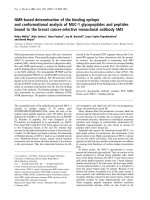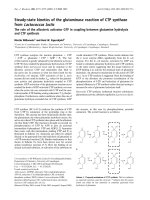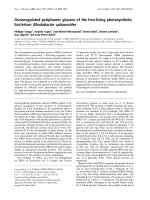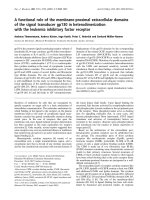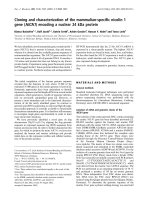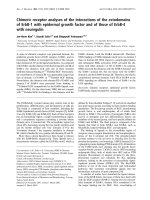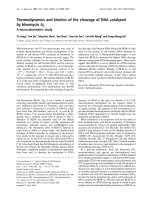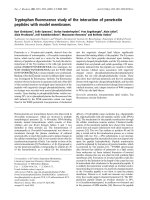Báo cáo y học: "GASNet.org: Management of the difficult airway" pdf
Bạn đang xem bản rút gọn của tài liệu. Xem và tải ngay bản đầy đủ của tài liệu tại đây (25 KB, 2 trang )
1
Available online />GASNet.org first went online in 1993; it was among the first
500 websites on the internet and was the first that was
dedicated to anesthesia and critical care. GASNET.org is
housed at Yale University, but it is a collaborative effort by
several American anesthesiologists. Although it is primarily
of interest to anesthesiologists, GASNet.org is a huge web
site with much to offer from an educational perspective.
Among many other resources, it features tutorials on
acid–base, transesophageal echocardiography,
hemodynamics, a clip art library, a multiplatform library of
downloadable freeware and shareware calculators, as well
as a database of key articles relevant to anesthesia. The
subject of this web report is a multimedia airway tutorial,
which provides an excellent and up-to-date review of both
basic and advanced airway techniques. The best way to
access the tutorial is to go directly to the URL
( />The tutorial is divided into 15 sections. It begins with a
summary of pathological conditions that may complicate
airway management – a feature seldom included in most
airway tutorials. Other sections review airway anatomy and
examination, the American Society of Anesthesiologists
Difficult Airway Algorithm, and setting up a difficult airway
cart for the operating room or the intensive care unit. A
section on airway adjuncts such as lighted stylets, gum
bougies and laryngeal masks instructs on the advantages
and disadvantages of each alternative, should conventional
direct laryngoscopy be unsuccessful. The tutorial finishes
with a step-by-step illustration of rarer techniques such as
retrograde intubation, cricothyrotomy and use of airway
exchangers. Each of these sections finishes with a video
demonstrating the technique.
The tutorial’s layout is clean and well referenced (with direct
links to abstracts on PubMed.com) and it has an excellent
navigation system. Many pages feature only a single
paragraph, which is an approach that is designed to hold
users’ attention, rather than requiring them to scroll through
line after line of text.
The airway tutorial takes advantage of the latest web browser
technology to provide a sophisticated navigation panel and
streaming video. The authors recommend viewing the site
with Internet Explorer 5.0 or Netscape 4.0, or later versions,
and the Apple QuickTime 4.0 plug-in is required to view the
videos.
Best feature
The two features of the tutorial that make it stand out from
other airway-related sites are the completeness of its
approach and its abundant use of pictures and videos to
illustrate airway anatomy and techniques. These would be
useful in their own right as teaching tools for medical
students and residents.
Worst feature
Some of the illustrations are small and the details are difficult
to make out. The site is also due for an update because many
references are somewhat dated and newer technologies
such as the Glidescope and the intubating laryngeal mask
airway (LMA; Fast-Track) are not included.
Wish list
Larger illustrations that dominate the page where they are
presented would enhance a visitor’s experience. An
introduction to medicating patients before intubation would
also be valuable.
Web report
GASNet.org: Management of the difficult airway
Craig D Baldry
Assistant Professor, Departments of Anesthesia and Critical Care, McGill University, Montreal, Quebec, Canada
Corresponding author: Craig D Baldry,
Reported: 18 October 2004 Critical Care 2005, 9:E18 (DOI 10.1186/cc2999)
Published online: 8 November 2004
This article is online at />© 2004 BioMed Central Ltd
Website Management of the difficult airway
URL />Cost Free
Keywords airway, intratracheal intubation, laryngeal masks
2
Other links
UCSD Virtual Difficult Airway Cart –
/>This site allows visitors to explore a difficult airway cart as
they are prepared at the University of California at San Diego.
It is useful for intensivists planning on stocking a difficult
airway kit for their intensive care unit.
ASA Practice Guidelines for the Management of the Difficult
Airway – />Difficult%20Airway.pdf
Updated in 2002, this is the consensus statement from the
American Society of Anesthesiologists presenting the
evidence (or lack thereof) and recommendations for different
airway management options.
Sponsors
The GASNet airway tutorial was sponsored by a grant from
Cook Critical Care, who manufacture many products for use
in the patient with a difficult airway. GASNet.org has many
industry sponsors. The complete list is available online
( />Competing interests
The author(s) declare that they have no competing interests.
Critical Care October 2005 Vol 9 No 5 Baldry
